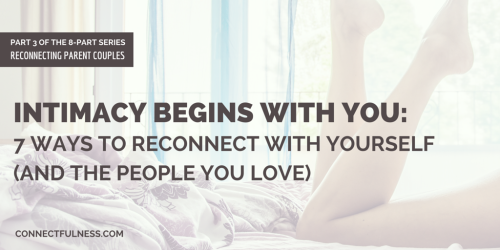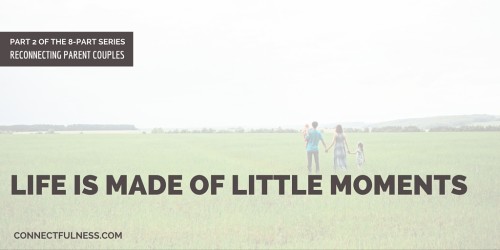Intimacy Begins With You: 7 Ways to Reconnect with Yourself (and the People You Love)
An 8-part blog series, helping parent couples reconnect.
A note on the Reconnecting Parent Couples Series: These eight posts present perspectives and advice from respected colleagues and experts from across the world. I’ll also weave in my personal and professional discoveries and introduce you to aspects of my evolving theory: Connectfulness.
>> Part 2: Life Is Made Of Little Moments <<
You want to show up for your partner? Reconnect with yourself first.
In the last two posts in this 8-part Reconnecting Parent Couples series we redefined intimacy and talked about making use of the little moments to connect. In this post, it’s time to look within.
All of your relationships are truly a reflection of you and who you really are. You learn about yourself when you interact with others and,in these exchanges, you’re presented with countless opportunities to grow and evolve. Real learning never occurs in in a vacuum. We are relational beings.
"We learn to love ourselves precisely because we have experienced being loved by someone. We learn to take care of ourselves because somebody has taken care of us. Our self worth and self-esteem also develop because of other people." Stan Tatkin, PsyD author of Wired for Love
In this post, I’m asking you to do something rather tricky.
First, I ask you to understand and agree that your perspective on relationships is primarily formed by the influence of other people. Then, I am going to ask you to take responsibility for transforming your relationship with your partner by shifting aspects of yourself.
Like I said - a little tricky, but I know you can do it and I promise it’s worth it!
Love is learned in childhood.
Within your romantic relationship you and your partner reenact that lessons of childhood. Whether you like this idea or not, your choice of a mate has a lot to do with the unconscious and unresolved experiences of your formative years.
In her book Falling in Love: why we choose the lovers we choose, Ayala Malach Pines describes how childhood experiences influence current relationships”
- the ways our caregivers expressed, or didn’t express, love towards us
- the ways our caregivers expressed, or didn’t express love towards one another.
From the very start of life children absorb messages about how humans are “supposed” to interact. Before you had any concept of marriage or partnership you were learning how to form relationships based on the way grown ups behaved. You were learning to trust others (or not). You were learning how to respond to others and what to expect when others responded to you.
Your children, of course, have been going through the exact same process since the moment of birth as well.
Childhood experiences color everything about what you understand about relationships.
Your childhood is the foundation of your inner world. These experiences are the basic framework you use to relate to your partner. It’s also precisely why your chosen partner is very likely your perfect partner to heal and grow with.
Even though your relationship has its hiccups and its clashes - everyone’s does, everyone’s - you gravitated towards a mate who could provide you with constant opportunities to resolve that childhood stuff.
And you offer the same to your partner too.
The potential for the healing effect of marriage and couplehood is mutual. And it is precisely because of all that you share - your bond with one another, your devotion to your children, and your shared legacy- that your are held in this traction to grow together.
But partnership doesn’t always feel healing. Often it hurts.
Your connection is strong, but it still strains sometimes.
That’s the thing though. That hurt. That pain. That’s where the lessons lie. If you and your partner can allow yourselves to lean into and share with one another those challenges can can enhance the relationship and deepen your intimacy.
I’m no exception. I struggle up against my own demons and my does my husband does too. The more we each are able to sit with and examine the old hurts the easier it is to recognize them when they show up in our lives together We are able to bear witness, together, We can drop our defensiveness and quiet our reactions when we see them without defense when we see them manifest in our interactions.
It’s no secret that my husband and I fight from time to time. Sometimes we even get loud. We also comfort, hug, and hear one another.
Disconnects happen (and we’ll talk more about later in this series),.but they’re not the heart of the story. The heart of it all - and where you should place your focus - is how you make repairs and how you reconnect. Here’s the kicker: in order to fully connect with your partner, in order to really invest in the relationship in a sustainable way, you need to reformulate your expectations.
What if, instead of focusing on the isolation and abandonment you feel when you disagree you focused on looking ahead? What if you anticipated the the reconnect rather than dwelling on the disconnect?
When you feel a distance between you, you can learn to refocus your attention. Pause, look within. Take inventory on what you are feeling, what needs you have, and ask yourself “Have I expressed them?”
Maintaining & repairing connections to others begins with connecting to yourself.
You go through life in constant relationship - to other people the environment you are in, and to yourself.
When you treat yourself poorly, you cannot soothe yourself. When you treat yourself with criticism, defensiveness and contempt, you tell yourself that’s all you deserve. How can you believe that others want to treat you any differently than you treat yourself?
In order to offer love and support to the people who matter most to you, you need to start with yourself. Love requires connection, so I called some of my brilliant colleagues to offer suggestion on how to reconnect with YOU.
7 Expert Tips on How to Reconnect with Yourself (and with the people you love)
Start by tuning in.
Listen.
“Listening to yourself is one of the most challenging and deeply rewarding endeavors you can embark upon. No one will ever hear you as deeply or understand you as richly as you can yourself.” Doree Lipson, LCSW-R
Practice mindfulness and choose to be aware of your own feelings.
“Being in a relationship with someone who is unaware of their feelings can be very challenging, if not infuriating. It's the person who tells you they're not angry at you, but finds small ways to put you down in public or private. What's infuriating is if you call them on it, they often say it's you that's the issue. It's the adult version of the older sibling that takes the arm of the younger one and says, "Why are you slapping yourself?" over and over. Besides therapy--or in conjunction with it--having a mindfulness practice is the best way I know to connect with feelings we avoidby the myriad ways we have to distract ourselves. Building this practice as a couple is challenging, but extraordinarily worth it.” Justin Lioi, LCSW
Connectfulness is a lifelong practice of relationship mindfulness. Really, that’s what we’re talking about here. Mindfulness is one of the most important things you can practice for yourself and yourself in relationship with others.
Take emotional responsibility.
Yes I know “take emotional responsibility” is a big, heavy phrase , but what we are talking about though is just that: BIG.
You, me, all of us must learn to pause more.Tune into yourself. Be attentive, and then from that space of awareness - not from impulsivity - redirect your attention to your mate (or children or anyone else who deserves your full attention).
“Emotional responsibility is about choices. It's when you choose to respond one way (that may provide the best possible outcome) rather than another way (that may simply be giving in to your natural impulse to defend, attack or push away).
Emotional Responsibility is when you choose to be happy over choosing to be right.” Robyn D'Angelo, LMFT
"Taking responsibility for yourself is an essential ingredient for having a connected relationship. Look toward yourself to be the catalyst and always be present by asking yourself what you can do to make your relationship more meaningful to both of you.” Stuart Fensterheim LCSW
Put on your oxygen mask.
You’ve heard about the whole self care thing a thousand times, but has it really sunk in yet?
“Self-care is fundamental to relationship-care! If an you are not doing well in taking care of yourself, how do you expect your relationship to thrive? If you love, honor, and treat yourself with kindness, your partner will recognize this. It's like when an airline attendant tells you to put on your own oxygen mask before assisting others. You have to take care of yourself first before you can take care of anyone else. I tell my clients who struggle with self-care that it is not self-serving; it's self-preserving. Practicing good self-care will only enhance your relationship because you won't have to depend solely on your partner to fulfill your happiness and well-being.” Christie Sears Thompson, MA-MFT
Start with what feels good.
When you start consciously practicing self care in order to connect with yourself, just make sure it’s not another tedious “to do.”
“What things do you like to do that feels good and fills you up? What self-care habits are good for you, like exercising (make it fun, not another thing you have to do), meditation (start with a few minutes especially if it is a new habit), or going out with friends, laughing, and having a good time.
If you are taking care of yourself you will be rested, can be more present, and be able to give to others.” Catherine O'Brien, MA, LMFT
Slow down.
Yes, slowing down may seem impossible (especially if you’ve got kids!), the good news is that it’s all about starting small.
"Creating (or recognizing) small moments throughout the day when you can check in with yourself, or notice something beautiful around you, or allow yourself to pause. We often think that reconnecting with ourselves needs to happen on a giant scale (yoga retreats, day-long spa appointments) but it can start right now, in the small moments - savoring a good cup of coffee (the smell, taste, watching the steam), taking 3 deep, intentional breaths, listening to a favorite song.
Reconnecting can start small, and still be incredibly meaningful." Maya Benattar, MA, MT-BC, LCAT
“Parents are pulled in so many different directions and you can lose sight of yourself. I challenge parents to do one thing for yourself daily that helps you slow down and reconnect to yourself -- read a chapter in a book, take a shower, go on a walk, watch a 30 minute show, or just sitting outside and taking in the day. Doing this recharges you and leaves you with more time for your kids and for your partner.” Mercedes Samudio, LCSW
Let go of critique.
Remember: in order to receive love from others you need to love yourself first. Give yourself permission to silence the inner critic so you can hear all the nice things you and everyone else has to say about you.
“Being comfortable in your own skin and finding time, even if it's 5 minutes a day to practice mindfulness and body awareness are huge for creating intimacy in our partnerships. If a person is disconnected from their own body, or spends time criticizing it, they will not be able to connect with their mate. Meditation, yoga, breathing, or 5 minutes of stillness are great ways to reconnect with our bodies.” Anna Osborn, LMFT
“The most important relationship you will ever be in, besides the one with your higher power, is the one with self. If you cannot show up in compassion, gentleness, humor and love to self, it will be challenging to do that with your significant other”. Mari A. Lee, LMFT, CSAT
Play with pleasure!
We’re talking about connecting to yourself and we’re talking about pleasure. I bet you can see where this is going...
“I ask women to masturbate. Many moms are so tired that their libidos are low, and this can help them explore what their bodies like and don't like without the added complexities of the relationship. I find this homework to be really illuminating! Often it is very hard for a mom to dedicate time to do this since it's not 'productive' or child oriented. She can discover important things, like if her libido is clinically depressed, and also new ways she likes to be touched. Outside of that, I encourage parents to play in their own lives, particularly doing things that aren't 'important' or on the to-do list. Intimacy requires a letting go of control, which is hard for parents, especially moms, and finding moments of undirected pleasure broadens the comfort zone for letting go and connecting.” Dr. Jessica Michaelson
“Sexually and sensually speaking, a great way to reconnect with yourself is through self pleasure (most commonly referred to as masturbation). It can be a safe space to explore and rediscover what you desire, like, and don't find arousing. You are always evolving which includes your sexuality. Additionally, going through a life changing transition, such as becoming parents, can impact your sex life. What once was a total turn-on may now be a major turn-off (i.e. nipple play now that you may be breastfeeding is just one of many examples). By allowing yourself the space and time to explore and practice, you can reconnect with your sexual and sensual self which not only benefits you, but also your sweetie!” Dr. Lily A. Zehner
This isn’t a simple “do these seven things and change your life instantly list.” This stuff is big. And here’s why:
Cultivating more intimacy in your life takes attention and more importantly, mindfulness. It has everything to do with where you choose to place your attention. It’s truly that simple. And also that complex because if you are anything like me then the trickiness lies in refocusing your priorities. When you really pay attention you might find that your conditioned ways of being don’t bring you the intimacy you crave.
It’s your awareness that will help you gain clarity into what’s missing. What I expect you will find is that one shift precedes the next. This is a path of lifelong learning that begins with tuning in, slowing down, taking responsibility, making space for more self care, silencing your inner critic, giving yourself permission to feel good & also to seek pleasure. What kind of relational changes will embodying that path invite into your life?
If I’ve got you wanting more, awesome! Now I challenge you to go a step further; pick out at least one thing you can do more of and do more of it. I would love to hear what shifts you experience, I invite you to email me or post in the comments below.
>> Part 4 | DISCONNECTION HAPPENS, OR, YES, HAPPY COUPLES FIGHT TOO! <<























 No wonder we struggle to connect to ourselves. No wonder intimacy and relationship satisfaction dwindles, especially after babies are born into families. No wonder we get frustrated with our children, lose our cool and then wonder why they don't listen to us. We've forgotten to play!
No wonder we struggle to connect to ourselves. No wonder intimacy and relationship satisfaction dwindles, especially after babies are born into families. No wonder we get frustrated with our children, lose our cool and then wonder why they don't listen to us. We've forgotten to play!

